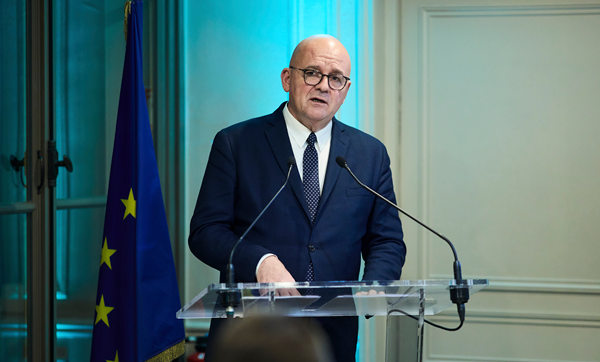ANALYSIS: Euronext chief Boujnah eyes opportunities in European derivatives
13th November, 2024|Luke Jeffs

Euronext chief executive Stéphane Boujnah has outlined the European exchange’s plan to expand in futures and options, citing various initiatives from the ambitious group.
Speaking as the European group announced last week third quarter revenue up 10% to €396.3m (£330m), Boujnah, chairman of the managing board and chief executive of Euronext, said the launch in September of Euronext Clearing opens up a brighter future for the group’s derivatives segment.
Boujnah, a former investment banker at Santander and Deutsche who became Euronext CEO in 2015, told FOW: “We have a strong derivatives business in selected geographies and various asset classes but we are not yet a large player in derivatives across the board. We want to become a bigger and more relevant player in derivatives in new asset classes where we are legitimate and in new geographies where we can offer a diversified competitive offering to clients.”
Euronext, which runs various European exchanges including those in France, the Netherlands, Norway and Ireland, has two key derivatives markets: European equity derivatives and commodity derivatives.
The group’s main index futures product is a futures contract based on the French blue-chip index, the CAC40, which traded 1.47 million lots last month, which was down a fifth on October 2023, according to FOW Data.
Euronext’s single stock futures and options faired better in October, reporting total volumes of 2.44 million lots which was down 4.7% on the same month last year, according to FOW Data.
Euronext’s main commodity derivatives are in European agricultural products where the milling wheat futures contract is the group’s most popular. This product traded 1.96 million lots in October which was up 43% on the same month last year, according to FOW Data.
Boujnah continued: “We want to be a challenger, leveraging the fact we now have our own clearing house which allows us to introduce fundamental changes to certain segments.”
Euronext completed in September the migration of its derivatives clearing business from LSE Group-owned LCH to Euronext Clearing, the group’s own clearing house.
This is strategically important as the control of clearing should enable Euronext to be more innovative in product development, particularly in European futures and options which is dominated by Deutsche Boeres’s Eurex based in Frankfurt.
One of the most ambitious plans unveiled by Boujnah last week is the group’s first move into energy derivatives by diversifying Euronext’s Oslo-based European power market into derivatives, supported by Euronext Clearing.
Boujnah told FOW: “We have an organic ambition to start offering a solution by beginning of 2025 and that would not have been possible without our clearing platform. We are creating an alternative offering in the electricity derivatives world which is currently dominated by Epex owned by Deutsche Boerse.”
The group also made available last month single stock options that reference firms listed on Euronext Dublin and Euronext Lisbon.
The group chief executive said: “This launch is motivated by a strong demand from most of our clients that have told us they would welcome more competition in single stock derivatives.”
And the European group signalled last week its plan to move for the first time into European government bond derivatives.
Boujnah said: “We believe there are some areas like fixed income derivatives, where we already have a strong business in government bonds, where the fixed income business is not necessarily at the right level yet. Some clients told us they would be interested if we were to build a fixed income platform.”
Asked about the tension between increasing competition and increasing fragmentation in these key European markets, Boujnah was unequivocal: “Clearly when we move in these segments we bump into large, powerful competitors, but the alternative is to watch them innovate while standing still. That’s not what we do. What we do is to develop new offerings and become more relevant to more people and one can only do that by fixing their problems.”
To be continued on November 14


